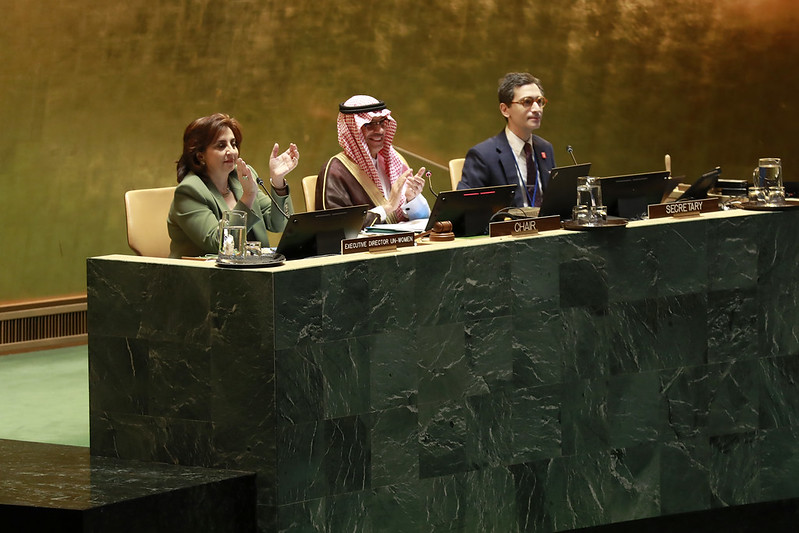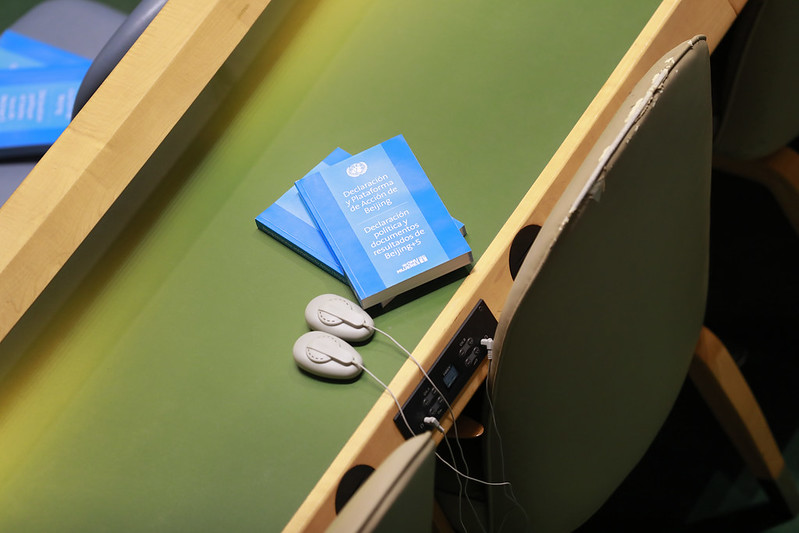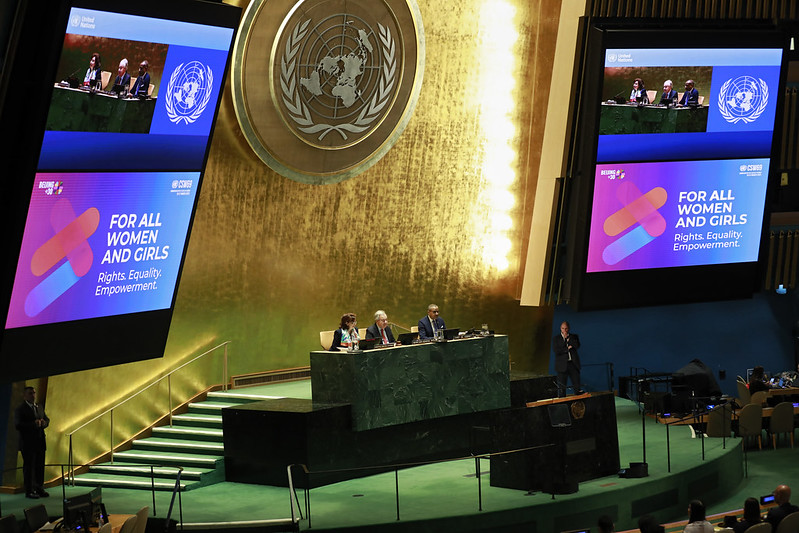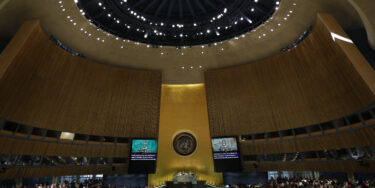As the 69th Commission on the Status of Women (CSW69) in New York City came to a close on March 21, 2025, feminists reflected on the impact of anti-rights actors on the outcomes of the session, in a context where gender justice goals seemed ready to be sacrificed.
Already, the setting for a 30th anniversary of the landmark Beijing Declaration and Platform of Action did not bode well. For starters, Saudi Arabia was chairing the session; not the best portent for the anticipated political declaration on gender equality. Countries with new and old anti-gender track records were also members of the Commission, including Argentina. Then, more broadly impacting both CSW69 and the global human rights landscape, the Trump administration had announced in February a visa ban on transgender athletes that could potentially expand to all trans people and affect participation over the two weeks.
Under his first term, Trump had introduced a “Muslim ban” affecting those traveling to the United States from seven Muslim majority countries. The ban has continued to impact the ability of some travelers to receive US visas, and Trump has since threatened to impose a new, expanded version. All this was in addition to US massive dismantling of its foreign assistance – followed closely by announcements from the Netherlands, the United Kingdom, and France who were also making deep cuts to their development budgets – all of which threatened civil society presence at CSW, particularly from the Global South, and in other multilateral spaces moving forward.

UN Women CC BY-NC-ND 2.0
Despite efforts to the contrary by certain Member States, this year’s CSW political declaration was adopted by consensus, renewing country commitments to the 1995 Beijing Declaration’s groundbreaking framework for gender equality and women’s rights. Unfortunately, in the current geopolitical moment with rising global authoritarianism, the US and Argentine representatives were well coordinated in raising objections every time the word gender, among other “diversity, equity, and inclusion” (DEI) related terms, were mentioned. This anti-gender and anti-DEI rhetoric also rang loud from the United States in the weeks prior to CSW during board meetings of UN agencies, including UN Women, which supports the convening of CSW. This constant obstruction made actors like the Holy See and Russia – traditionally very vocal in opposing any gender and sexuality related progressive language during negotiations – seem almost reasonable during negotiations. Meanwhile, Saudi Arabia, despite its own human rights track record, was keen to have a political declaration adopted by consensus to reflect positively on its chairmanship.
In the end, all was not lost. The final text included the first-ever reference to gender-based violence in a CSW political declaration, held the line on LBTQI inclusion, as well as language on the recognition, reduction, redistribution, reward, and representation of care. However, it should come as no surprise that the outcome document reflected major losses for the feminist movement. Unfortunately, there is a total absence of sexual and reproductive health (SRHR) and rights or comprehensive sexuality education, as well as weak language related to climate change. Some Member States, from Latin America (sans Argentina), the Mountains Group, and the European Union, fought to keep out of the text the essentializing term “motherhood”, as well as conservative language around “the family”.
While anti-rights groups, like the Center for Human Rights and the Family (C-Fam), crowed about the “feminist outrage” on loss of SRHR and sexuality education language, they lamented in turn language that remained in the text, such as references to “gender” and “intersecting forms of discrimination.” The latter, they claim, “is often used to bring in issues of gender identity and sexual orientation.” Some anti-rights groups like Ordo Iuris from Poland congratulated the presence of a “coalition of pro-life organizations” to deter any language on SRHR. C-Fam and its anti-gender allies both among civil society and Member States, including the United States, focused their CSW efforts on the “protection” of women. In their worldview, this requires promoting anti-transgender, anti-sex work, anti-abortion, anti-pornography, and anti-assisted reproduction ideologies.

UN Women CC BY-NC-ND 2.0
In an interesting twist that reflects wider global discussions on “truth” within growing authoritarian states, anti-rights groups questioned definitions of disinformation and misinformation at CSW, as well as the role of artificial intelligence. However, much of the tried and true victimhood rhetoric was replayed at this CSW by these groups, as well as their usual cooptation of human rights language. For the second consecutive year, C-Fam hosted a parallel CSW – the Conference on the State of Women and the Family, or CSWF – co-sponsored by the Heritage Foundation (of Project 2025 fame) and the anti-abortion Canadian group Campaign Life Coalition, among others, because of their supposed exclusion from CSW. Preaching to its own choir of youth activists from US Christian universities and anti-gender groups, like Family Watch International, the two-day event did not reveal much new rhetoric nor a particularly high turnout.
Unfortunately, the US mission to the UN lent credibility to the event by co-sponsoring a C-Fam session and delivering remarks “on the Gender Ideology Assault on Women and the Family.” Additionally, following CSWF, its anti-gender youth participants targeted progressive events, both those hosted by Member States and civil society, attempting to intimidate panelists and participants with anti-abortion comments and questions at the end of sessions. There was a marked coordination and increase in consistency from 2024. More than usual, opposition groups honed in on language of exclusion and cries of being systematically targeted by the feminist movement. They tried to participate in events that were registration only, and reported increased exclusion from debates, lending credibility to their claims of exclusion.
Some mention was made of the Geneva Consensus Declaration as an organizing force for the anti-gender movement at the United Nations, again, including by the acting US representative to the UN. However, most new themes identified across anti-gender sessions, both at CSWF and at official side events with member states, focused on: pitting “motherhood” against gender equality; supporting “mental health” in the context of post-abortion care and as an alternative to gender-affirming care; and the continued cooptation of disability rights; in addition to a consistent anti-transgender focus, using the narrative of “gender ideology”. The latter was unfortunately enhanced by the positioning of the Special Rapporteur on Violence against Women and Girls. Her online participation in several anti-gender CSW side events alongside groups like C-Fam and CitizenGO not only targeted transgender populations, but additionally lifted up anti-abortion and anti-LGBTQI groups more broadly. This year, CitizenGO had five buses, targeting both abortion and transgender people.

UN Women CC BY-NC-ND 2.0
“The scourge of porn” and sex work as violence against women was unfortunately, but predictably, mainstreamed by multiple governments and civil society organizations, led by the Europeans Women’s Lobby, who allied on side events to hammer in very similar talking points. These events conflated prostitution with sex trafficking and digital exploitation, emphasizing how technology increases vulnerabilities. Speakers highlighted the failures of legalization and decriminalization models and advocated for the abolitionist model, emphasized the need for legislative changes, survivor-led advocacy, and international coalitions to push for the abolitionist model across Europe.
Though their incessant victimhood narrative would have most believe otherwise, this CSW69 demonstrated how anti-rights actors have never been more emboldened. These groups and Member States continue to engage in the multilateral space, seeking to weaken it from within internal structure while also attacking and defunding it from the outside. As this happens globally and from UN spaces both in New York City and Geneva, the normative framework for women rights is likely to continue losing power and value.
As such, we expect the upcoming 58th Commission on Population and Development, April 7 to 11, to also be a difficult negotiation. The Human Rights Council session, still ongoing at time of writing, is exhibiting similar trends. The increasing difficulties in holding accountable States that do not implement or violate those normative frameworks have made feminists more and more critical of spaces like CSW. Questions about the relevance of the UN, combined with its increasing inaccessibility, are likely to push more and more feminists away from international policy spaces, making it even easier for anti-rights groups to take over. Calling for more civil society access – through the CSW revitalisation process or the methods of work discussion happening next year – would be one way to resist. Civil society organisations have consistently advocated for more and better ways to contribute and be part of the discussion. It is time for Member States who care about the UN system to act upon those many recommendations.
The Observatory on the Universality of Rights would like to thank the members of the Women’s Rights Caucus who contributed to coverage of CSW69 and the development of this document.



